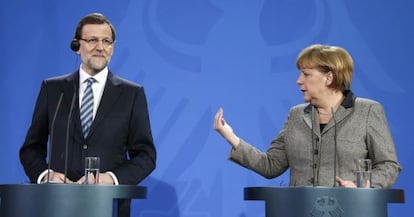Rajoy on slush fund: “It is all untrue, except for some things”
PP plans to sue “everyone” who made impropriety allegations Merkel skirts questions about corruption; stresses bilateral ties

Answering reporters’ questions for the first time since details emerged late last week about an alleged slush fund his Popular Party (PP) controlled, Prime Minister Mariano Rajoy said on Monday in Berlin that all the information that has been published by the media “is untrue — except for some things.”
The somewhat confusing statement came during a question-and-answer session Rajoy held alongside German Chancellor Angela Merkel following their meeting to discuss Spain’s economy and the reforms being carried out by his government.
“I repeat what I said Saturday: everything that has been said about me and my colleagues in the party is untrue, except for some things that have been published by some media outlets,” the 57-year-old prime minister said.
The conservative leader did not clarify what things he believes are false, nor did he answer a Spanish reporter’s question as to who he or his party plan on suing for alleging that many officials, including himself, were given bonuses from a secret fund on top of their regular salaries.
Everything that has been said about me and my colleagues in the party is untrue, except for some things”
Back in Madrid, party officials were preparing a batch of lawsuits against “everyone” who has alleged that Rajoy and other PP members received fat cash bonuses. According to the information obtained by EL PAÍS from former PP treasurer Luis Bárcenas’ secret account ledgers, Rajoy received more than 322,000 euros between 1987 and 2008.
Carlos Floriano, the deputy secretary general for organization and the PP’s number three, said that the decision was made on Monday. “We are just waiting to see whether we should go the civil or criminal route,” Floriano said, without mentioning Bárcenas or anyone else by name. When asked who the party was planning to sue, he said: “Everyone who has presented, leaked and published” the allegations.
On Saturday, Rajoy appeared before the cameras to refute the allegations, but reporters were kept in a separate room and not allowed to ask the prime minister any questions.
A visibly upset Merkel had to respond on two occasions to questions about the ongoing corruption cases in Spain, including an uncomfortable mention about illegal financing in her conservative Christian Democratic Union in 1999, when Helmut Kohl was leader. At one point she tried to avoid answering a reporter’s question on whether she was concerned about Spanish corruption.
“What is important is the relationship between the two governments,” she said.
In Spain, Socialist Party number two Elena Valenciano commented on Rajoy’s point that everything was false, except for some things. “The question is: how many things, and which ones?” she asked on Twitter.
Meanwhile, more PP officials have come forward to acknowledge the information contained in Bárcenas’ bookkeeping. Santiago Abascal, a former PP member of the provincial parliament in Álava, whose name appears as receiving two million pesetas [about 12,000 euros] in 1999, said he asked the party for the money after his business was attacked by terrorists. “I told the party that I couldn’t make ends meet and they gave me two million pesetas,” he said.
Tu suscripción se está usando en otro dispositivo
¿Quieres añadir otro usuario a tu suscripción?
Si continúas leyendo en este dispositivo, no se podrá leer en el otro.
FlechaTu suscripción se está usando en otro dispositivo y solo puedes acceder a EL PAÍS desde un dispositivo a la vez.
Si quieres compartir tu cuenta, cambia tu suscripción a la modalidad Premium, así podrás añadir otro usuario. Cada uno accederá con su propia cuenta de email, lo que os permitirá personalizar vuestra experiencia en EL PAÍS.
¿Tienes una suscripción de empresa? Accede aquí para contratar más cuentas.
En el caso de no saber quién está usando tu cuenta, te recomendamos cambiar tu contraseña aquí.
Si decides continuar compartiendo tu cuenta, este mensaje se mostrará en tu dispositivo y en el de la otra persona que está usando tu cuenta de forma indefinida, afectando a tu experiencia de lectura. Puedes consultar aquí los términos y condiciones de la suscripción digital.








































